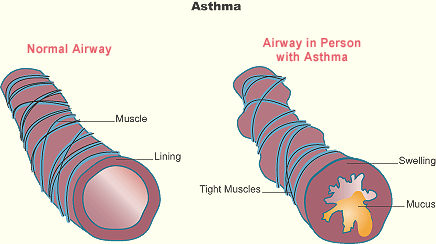What Is Asthma?
Asthma (Az-muh) is a chronic disease that affects
your airways. The airways are the tubes that carry air in and out of your
lungs. If you have asthma, the inside walls of your airways are inflamed
(swollen). The inflammation (IN-fla-MAY-shun) makes the airways very sensitive,
and they tend to react strongly to things that you are allergic to or find
irritating. When the airways react, they get narrower, and less air flows
through to your lung tissue. This causes symptoms like wheezing (a whistling
sound when you breathe), coughing, chest tightness, and trouble breathing,
especially at night and in the early morning.
Asthma cannot be cured, but most people with asthma
can control it so that they have few and infrequent symptoms and can live
active lives.
When your asthma symptoms become worse than usual,
it is called an asthma episode or attack. During an asthma attack, muscles
around the airways tighten up, making the airways narrower so less air flows
through. Inflammation increases, and the airways become more swollen and even
narrower. Cells in the airways may also make more mucus than usual. This extra
mucus also narrows the airways. These changes make it harder to breathe.

Asthma attacks are not all the same—some are
worse than others. In a severe asthma attack, the airways can close so much
that not enough oxygen gets to vital organs. This condition is a medical
emergency. People can die from severe asthma attacks.
So, if you have asthma, you should see your doctor
regularly. You will need to learn what things cause your asthma symptoms and
how to avoid them. Your doctor will also prescribe medicines to keep your
asthma under control.
Taking care of your asthma is an important part of
your life. Controlling it means working closely with your doctor to learn what
to do, staying away from things that bother your airways, taking medicines as
directed by your doctor, and monitoring your asthma so that you can respond
quickly to signs of an attack. By controlling your asthma every day, you can
prevent serious symptoms and take part in all activities.
If your asthma is not well controlled, you are
likely to have symptoms that can make you miss school or work and keep you from
doing things you enjoy. Asthma is one of the leading causes of children missing
school.
May 2008
|

